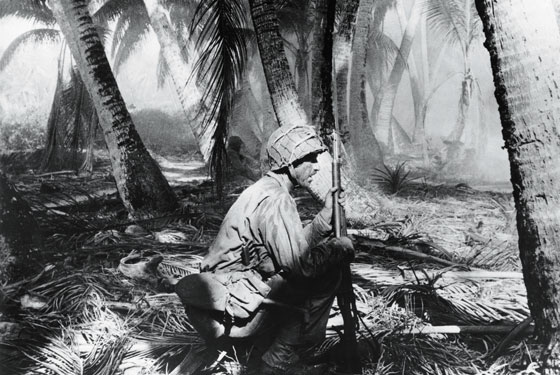 |
(Photo: Library of Congress, Prints and Photographs Division/Courtesy of PBS) |
One of the many servicemen we meet in the first two hours of the latest Ken Burns mini-series—and then follow from their hometowns to boot camp to the killing fields of Europe, Africa, and Asia—refuses to call the Second World War a “good” one, because how can any war be good? But “just” it certainly was, even if we only found out exactly how justified after the fighting had finished and the death camps were opened up to cameras.
Burns, of course, has specialized in the “just” documentary: honorable, worthy, long-form, and self-satisfied. With The War, he and his co-producer and co-director Lynn Novick take fifteen hours and seven nights to get from Pearl Harbor to Hiroshima, with flashbacks to Kristallnacht and book burning, Mussolini and Ethiopia, and the falls of Poland and Paris. Early on, we are reminded that civil liberties for Japanese Americans disappeared into internment camps, that blacks and whites in the American military remained segregated until after the war, that Douglas MacArthur was better at showboating than he was at generalship, and that Bing Crosby’s “White Christmas” was insupportably sappy from the very start.
Burns’s familiar narrative method, abetted here by Geoffrey Ward’s intelligent script, is to shuttle between period footage, superbly edited newsreel accounts (London during the Blitz, the Russian front), home movies, and family photos from such hometowns as Luverne, Minnesota; Mobile, Alabama; and Waterbury, Connecticut. You’ll notice that, for a Ken Burns special, The War is surprisingly short on talking-head dogmatists, largely bereft of celebrity actors reading the mail of the blameless dead, and altogether innocent of rinky-dink piano-roll music. Except for vivid personal witness, there is very little new and nothing provocative here on a subject that has been elsewhere endlessly rehearsed. But since veterans of World War II are dying out at a rate of a thousand a day, it’s the nuanced, retrospective witness that makes the series so affecting, the testimonies of survivors who remember both who it is they used to be and the 408,000 fellow Americans who didn’t make it.

